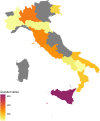Emotional status and fear in patients scheduled for elective surgery during COVID-19 pandemic: a nationwide cross-sectional survey (COVID-SURGERY)
- PMID: 37386661
- PMCID: PMC8613518
- DOI: 10.1186/s44158-021-00022-7
Emotional status and fear in patients scheduled for elective surgery during COVID-19 pandemic: a nationwide cross-sectional survey (COVID-SURGERY)
Abstract
Background: Fragmented data exist on the emotional and psychological distress generated by hospital admission during the pandemic in specific populations of patients, and no data exists on patients scheduled for surgery. The aim of this multicentre nationwide prospective cross-sectional survey was to evaluate the impact of pandemic on emotional status and fear of SARS-CoV-2 contagion in a cohort of elective surgical patients in Italy, scheduled for surgery during the COVID-19 pandemic.
Results: Twenty-nine Italian centres were involved in the study, for a total of 2376 patients surveyed (mean age of 58 years ± 16.61; 49.6% males). The survey consisted of 28 total closed questions, including four study outcome questions. More than half of patients had at least one chronic disease (54%), among which cardiovascular diseases were the commonest (58%). The most frequent type of surgery was abdominal (20%), under general anaesthesia (64%). Almost half of the patients (46%) declared to be frightened of going to the hospital for routine checkups; 55% to be afraid of getting SARS-CoV-2 infection during hospitalization and 62% were feared of being hospitalised without seeing family members. Having an oncological disease and other patient-related, centre-related or perioperative factors were independently associated with an increased risk of fear of SARS-CoV-2 infection during hospitalization and of being hospitalised without seeing family members. A previous infection due to SARS-COV-2 was associated with a reduced risk of worse emotional outcomes and fear of SARS-CoV-2 infection during hospitalization. Patients who showed the most emotionally vulnerable profile (e.g. use of sleep-inducing drugs, higher fear of surgery or anaesthesia) were at higher risk of worse emotional status towards the hospitalization during COVID-19 pandemic. Being operated in hospitals with lower surgical volume and with COVID-19 wards was associated with worse emotional status and fear of contagion.
Conclusions: Additional fear and worse emotional status may be frequent in patients scheduled for elective surgery during COVID-19 pandemic. More than half of the participants to the survey were worried about not being able to receive family visits. Psychological support may be considered for patients at higher risk of psychological distress to improve perioperative wellbeing during the pandemic.
Keywords: COVID-19; Emotional status; Perioperative medicine; Survey.
© 2021. The Author(s).
Conflict of interest statement
Dr. Andrea Cortegiani is an Associate Editor for JAACC. Dr. Fabiana Madotto is a statistical Editor for JAACC. All the other authors declare that they have no competing interests.
Figures
References
-
- Campo G, Fortuna D, Berti E, De Palma R, Di Pasquale G, Galvani M, et al. In- and out-of-hospital mortality for myocardial infarction during the first wave of the COVID-19 pandemic in Emilia-Romagna, Italy: A population-based observational study. Lancet Reg Heal - Eur. 2021;3:100055. doi: 10.1016/j.lanepe.2021.100055. - DOI - PMC - PubMed
-
- Aldujeli A, Hamadeh A, Tecson KM, Krivickas Z, Maciulevicius L, Stiklioraitis S, Sukys M, Briedis K, Aldujeili M, Briede K, Braukyliene R, Pranculis A, Unikas R, Zaliaduonyte D, McCullough PA. Six-month outcomes for COVID-19 negative patients with acute myocardial infarction before versus during the COVID-19 pandemic. Am J Cardiol. 2021;147:16–22. doi: 10.1016/j.amjcard.2021.01.043. - DOI - PMC - PubMed
LinkOut - more resources
Full Text Sources
Miscellaneous


